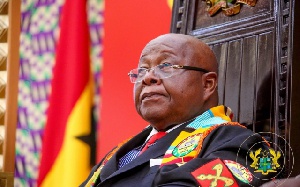 Speaker of Parliament, Prof. Mike Oquaye
Speaker of Parliament, Prof. Mike Oquaye
The Speaker of Parliament, Rt. Hon. Prof. Aaron Michael Ocquaye, says he has been impartial in all his deliberations ever since he assumed the number three highest position of the land, including but not limited to the Minority National Democratic Congress (NDC) Caucus.
The Minority NDC Caucus on Wednesday, March 7, 2018, embarked on a sit-down strike in what they termed protest against the Speaker for being partial against their course.
It all started when the Minority Leader, Haruna Iddrisu, rose up with the intent of catching the eye of the Speaker to make an intervention during a presentation to the House by the Deputy Minister for Agriculture, Kennedy Ohene Nyarko.
But the Minority was ignored by the Speaker, paving the way for the Deputy Minister for Agriculture to conclude his presentation, with the Speaker, also giving the floor to the Minister for Foreign Affairs and Regional Integration, Shirley Ayorkor Botchwey, to make a statement on the alleged slave trade of Africans in Libya.
This compelled the Minority NDC Caucus to embark on a sit-down strike in protest against the Speaker for being partial to them.
However, the Speaker reacting to the concerns of the Minority NDC Caucus moments after opening Thursday’s sitting said he has been impartial to in all his deliberations.
He told the House that he was only going by the strict one-hour rule which was adopted by the previous Parliament, citing Order 69 of the Standing Orders of Parliament to buttress his argument.
“Order 69 of the Standing Orders of Parliament does not exclude the decision of this House which you know very well that it is the same policy procedure which the immediate past Parliament approved and which was adopted by the House and it applies across the board. If you want us to think of something else, leaders, please the next time we meet you may put your heads together and come to a conclusion that it is most improper to come to the House when we all agreed on matters of procedure and give the impression that somebody is being discriminated against. That is not so”, he noted.
He added “And anybody who was in the past Parliament will know that is what prevailed and it was adopted. In fact, that is not what I started but it was so adopted so if you think otherwise, you may advise your leaders but that is not what we all ought … and it has a reason of enabling us to contain more questions within the one hour allowed for question. But otherwise, in all aspects, that when it is one hour, we stop. But this is what was decided by the House”.